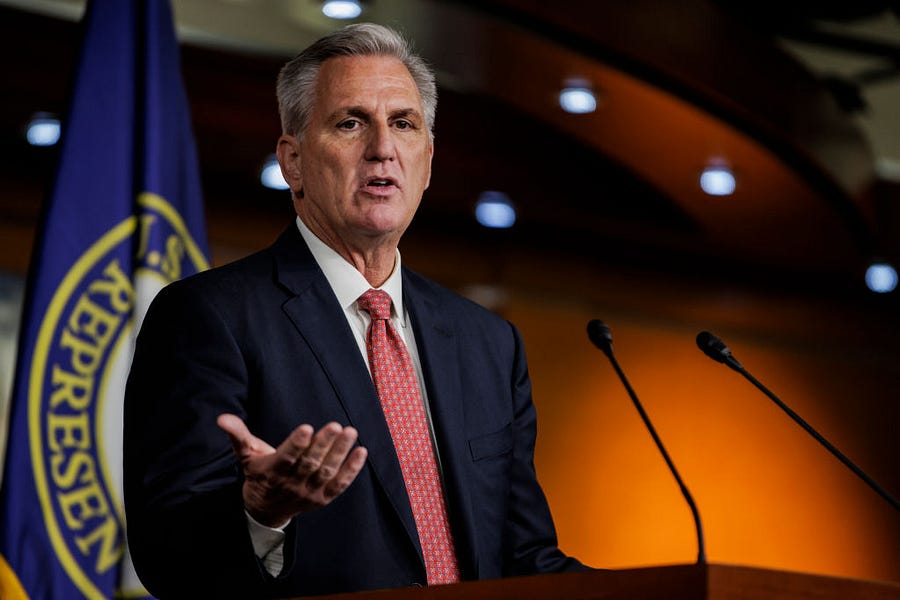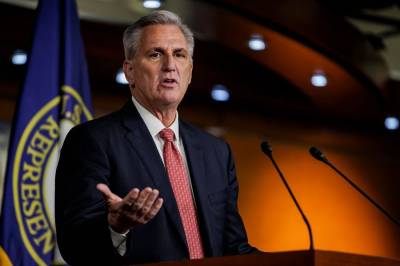House Minority Leader Kevin McCarthy’s joint fundraising PAC, Take Back the House 2022, raised a combined $823,000 last year for five of the 10 House Republicans who voted to impeach former President Donald Trump. The fundraising pits the Republican leader of the lower chamber against the former president and the candidates he has endorsed in three of those primaries ahead of the November midterms.
The House Republicans who voted for impeachment in 2021 have presented a dilemma for House GOP leaders who want to hold incumbent seats in swing districts without provoking the ire of the former president, whose main goal since January 2021 has been to oust members of the party he deems insufficiently loyal - to Trump.
“I guess the question is, are we going to start playing in primaries? … That’s [McCarthy’s] business, not mine,” GOP Rep. Andy Biggs told The Dispatch Tuesday. As former chairman of the House Freedom Caucus, Biggs spearheaded two failed attempts last year to remove pro-impeachment GOP Reps. Liz Cheney and Adam Kinzinger for their decision to serve as the only two Republican members of the House Select Committee investigating January 6.
The spending makes clear that McCarthy believes that a vote to impeach Trump shouldn’t necessarily cost a House GOP member fundraising support from party leaders, at least when it comes to incumbents who are running for reelection in competitive districts. Per FEC filings updated Monday, last year Take Back the House 2022 raised $178,293.13 for David Valadao of California, $159,856.96 for Peter Meijer of Michigan, $160,600.23 for Jaime Herrera Beutler of Washington, and $163,713.72 for Fred Upton of Michigan. Take Back the House 2022 also gave $160,600.26 last year to New York GOP Rep. John Katko, who announced this month he will not seek reelection.
The PAC spent $42 million last year in total, but raised no money in 2021 for pro-impeachment GOP Reps. Kinzinger of Illinois, Anthony Gonzalez of Ohio, Dan Newhouse of Washington, Tom Rice of South Carolina, or Cheney of Wyoming. Neither Gonzalez nor Kinzinger (whose Illinois district was shredded by the Democratic-controlled state legislature) is seeking reelection in 2022.
Two pro-impeachment House Republicans said Tuesday that McCarthy’s fundraising support for Herrera Beutler, Upton, Meijer, Valadao, and Katko can be traced to the competitiveness of their districts heading into 2022. Valadao, for example, won California’s 21st Congressional District by less than one point in 2020. Herrera Beutler and Katko won their races last year by slightly higher margins, carrying 56.4 and 53.1 percent of the vote in their districts, respectively.
“The qualifications for [getting money from Take Back the House] were what your margin of victory was,” said Meijer, who got a total of $159,856.96 in fundraising last year from the McCarthy-aligned PAC. “It was an objective criteria based on the competitiveness of those seats.” Meijer won 53 percent of the vote compared to his Democratic opponent’s 47 percent in last year’s general election, but that margin of victory may shrink this fall as a result of the state’s newly announced redistricting map.
These races matter for several reasons. Republicans need to win them to ensure they take back control of the House, something most election experts expect them to do. “Meijer’s district got significantly more Democratic in redistricting,” said Kyle Kondik, an elections analyst at Sabato’s Crystal Ball. “Valadao is now going to hold a district that Biden won by about a dozen points, so these are important members for winning the majority.”
“McCarthy would be foolish to cut them off and he’s not,” Kondik said.
But there’s another motivation for McCarthy to help these pro-impeachment Republicans: He wants to be speaker of the House. While boosting incumbents Trump is trying to defeat could complicate McCarthy’s relationship with the former president, helping them get reelected makes it all the more likely they’ll support him to lead the House GOP in the next Congress.
In contrast to the five pro-impeachment Republicans who scored a fundraising boost from Take Back the House 2022 last year, Rice carried 61.8 percent of the vote in his South Carolina district in 2020. “McCarthy’s focused elsewhere,” Rice said in an interview Tuesday, the same day Trump endorsed a primary challenger in his race. “I got a pretty safe Republican seat.”
Upton, Meijer, and Herrera Beutler have all drawn Trump-endorsed primary challengers who likely will run to the right of them, although all three incumbents have managed to rake in more than their opponents. Herrera Beutler, for example, raised $523,591.47 in the fourth quarter of 2021 and ended the year with nearly $1.7 million on hand. Her Trump-endorsed opponent, Joe Kent, raised $452,131.62 in the fourth quarter and ended 2021 with $998,919.80 on hand.
Kent told The Dispatch at September’s “Justice for J6” rally that McCarthy’s fundraising support for pro-impeachment Republicans is akin to “smacking the base of the Republican Party in the face.” Kent added that he would not support McCarthy as speaker if he ends up beating Herrera Beutler in the primary. “Kevin McCarthy, right now he’s running a classic GOP grift,” Kent said. “The Republican Party is, what, 93 percent behind Trump? So he’s going and funding half of the impeachment voters, and people need to realize that it’s a big grift.”
Upton ended 2021 with roughly $1.5 million in cash on hand compared to his Trump-endorsed primary challenger Steve Carra, who finished the year with just $134,398.69 in the bank. Meijer finished 2021 with $859,160.66 on hand, ending the year lightyears ahead of his Trump-endorsed primary challenger, John Gibbs.
Even those who didn’t get any fundraising from Take Back the House 2022 still far outpaced the fourth quarter fundraising of their Trump-endorsed primary challengers. Wyoming Rep. Liz Cheney had the most striking fourth quarter fundraising haul, raising $2.05 million last quarter and ending 2021 with $4.7 million on hand. She significantly outperformed her Trump-endorsed primary challenger Harriet Hageman, who only raised $443,460 in the fourth quarter of 2021 and ended the year with $381,163.
It’s no surprise that Cheney didn’t receive any fundraising help last year from McCarthy, who joined his colleagues in booting her as House GOP Conference Chair in May for her continued criticism of Trump. Wyoming’s sole congressional district is also reliably red: Cheney carried 68 percent of the vote in 2020.
Still, she’ll likely face a tough primary challenge from Hageman in August as a result of her decision to join the January 6 House Select Committee.* Some House Republicans have even gone so far as to suggest that she and Kinzinger, the only other House Republican on the House Select Committee, ought to be removed from the House GOP conference.
Like Cheney, Rice, of South Carolina, is convinced that backing from the former president won’t make or break his re-election prospects. “It was getting kind of embarrassing, all those guys parading down to Mar-a-Lago every day and then begging for endorsement,” Rice said. “They’re all gonna have to get patches on the knees of their pants from begging.”
Rice has significantly outraised his Trump-endorsed primary challenger in 2021, but may end up facing a tough primary battle this year for his continued criticism of the former president in a state Trump won by roughly 12 points in 2020. “I just couldn't stomach these guys that are having to pledge in blood undying loyalty to a guy who’s willing to sack the Capitol to keep his hold on power,” Rice told The Dispatch Tuesday evening.
*Correction, February 2, 2022: This article initially provided an incorrect date for the Wyoming Republican primary.







Please note that we at The Dispatch hold ourselves, our work, and our commenters to a higher standard than other places on the internet. We welcome comments that foster genuine debate or discussion—including comments critical of us or our work—but responses that include ad hominem attacks on fellow Dispatch members or are intended to stoke fear and anger may be moderated.
With your membership, you only have the ability to comment on The Morning Dispatch articles. Consider upgrading to join the conversation everywhere.